Yves here. My goodness! John Helmer’s critical review of Thane Gustafson’s new book, Klimat, Russia in the Age of Climate Change, appears to have riled Gustafson’s allies. After Helmer’s article was reproduced (without permission!) in the influential Johnson’s Russia List limited-circulation daily bulletin, his site was taken down by a DDoS attack.
Seems like the thought police are doing overtime. Helmer’s sin was catching out Gustafson committing what is awfully close to academic fraud. Gustafson wrote an entire book about the Russian energy and metals industries when per his own effective admission, he never talked to anyone who knows anything about it, nor consulted their research or data.
Now in fact Russia is a major producer of fossil fuels and also mines a bunch of materials, which is often energy intensive and otherwise nasty. But if an academic is going to write a book about these sins, it’s incumbent for him to investigate his targets and not rely on prejudices and the likes of Anatoly Chubais.
By John Helmer, the longest continuously serving foreign correspondent in Russia, and the only western journalist to direct his own bureau independent of single national or commercial ties. Helmer has also been a professor of political science, and an advisor to government heads in Greece, the United States, and Asia. He is the first and only member of a US presidential administration (Jimmy Carter) to establish himself in Russia. Originally published at Dances with Bears

There ought to be a law, or at least a sanction – tenure cancelled, travel visa blocked – for American experts on Russia who claim to know from their reading of other American experts on Russia why Russia does things, and what will happen next.
Thane Gustafson, a Georgetown University professor publishing at the Harvard University Press, claimed very recently “it’s not too hard to reconstruct at this point what was likely going through Putin’s mind as he gave the order to attack…Putin was not nuts, not deranged, not isolated, etcetera. It was all a reasonable bet—by his strange lights—except that every one of the premises turned out to be wrong.” Gustafson is certain he knows this; how he doesn’t say.
But then Gustafson concedes: “All the cards are up in the air, and who knows how they will come down…I don’t know how this ends.”
There’s modest uncertainty for you — except that Gustafson is kidding. He wants you to know, he also says, that Russia is now a fascist state, and there’s really only one thing left he doesn’t know: because it’s such an effective fascist state, “the fact is that because of the regime’s control of information, we have very little idea of how Russians actually feel about the war, and how they will react to Putin’s apparent defeat.”
Gustafson didn’t notice he was squatting on the horns of a dilemma. If Russian regime control of information is so total(itarian), Gustafson’s information must come from the other side – American, Canadian, British, NATO headquarters in Brussels. The technical terms which professors usually apply to information emanating from one side of a two-sided war are misinformation, disinformation, propaganda, active measures, fake news, lies. Between these things and the information Gustafson says he’s sure of, he has trolled himself.
So, to repeat the question, what if Russians actually support the war and blame the US for starting it? What if they are as certain of this as Gustafson is certain Putin started it?
And what if the war ends in the US and NATO alliance retreat to Lvov; after which the Polish government will notify NATO HQ it is reviving its treaty claim to the Galician territory of the Ukraine; the chancellery in Berlin will then inform Brussels it requires the return of the ancient Danzig Corridor and Breslau, Polish territories currently called Gdansk, Wroclaw, and the Ziemie Odzyskane; and the Hungarian government will follow suit with the announcement of the recovery of historical Kárpátalja (Transcarpathia), the Zarkarpatska oblast of the Ukraine?
These were the spoils of the World War II settlement between the US and the Soviet Union in 1945-46. The territorial reversion claims aren’t new. What is new is that the US and the NATO alliance, plus the Galician regime still ruling between Kiev and Lvov, also in Ottawa, have aimed to change the terms of the post-war settlement by continuing the war eastward on to the territory of Russia itself, all the way to regime change in Moscow.
That is what Russia says it is fighting now to defend itself against. As Russian officials have been hinting in recent days, the foreign and defence ministries and the intelligence services are currently discussing in the Kremlin Security Council whether Russia’s long-term security on its western front may be best served by terms of a Ukrainian settlement in which the German, Polish, and Hungarian territorial claims are recognised.
So, if these are indeed the cards that are up in the air, as the professor in Washington, DC, acknowledges, he isn’t the only one who doesn’t know how they will come down.
In the meantime he and the Harvard printers want their new book to be a weapon in this war, targeted directly at President Vladimir Putin in the Kremlin. But what if the weapon misfires and they lose this war? Will Gustafson admit his ignorance or his mistake or his deception? Should he resign his professorship? Should Harvard pulp the new book? Or is the state in which Gustafson lives and lectures such an effective fascist state, losing the war against Russia to Germany, Poland and Hungary, minus the Ukraine, plus Russia, won’t matter to US officials any more than losing Afghanistan, Iraq, Libya, and Syria?
Gustafson’s book is titled Klimat, Russia in the Age of Climate Change. This is climate change as a war weapon – not the science of global warning, but the idea that because of it, Russia in general, Putin in particular, are doomed to collapse. “Climate change is not the cause of these problems. It is a catalyst. Through the internal and external costs it will increasingly impose on Russia, it will precipitate the end of Russia’s hydrocarbon model, while denying it the revenues and resources it will need to bring about change.”
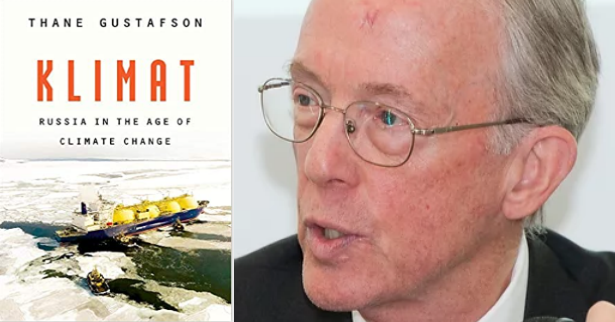
Source: https://www.amazon.com/Klimat-Russia-Age-Climate-Change/
Gustafson issued an update of his assessment in an interview with a former PhD student of his in The Atlantic in April: “At the time I wrote the book—and even as recently as two months ago—it looked as though the Russian ‘gas bridge’ to Europe would still survive for another decade, but would then gradually decline, and that applies to oil and coal as well as gas. But now the future of Russian gas in Europe suddenly looks doomed.”
Putin is to blame, Gustafson claims, because he has invested in military spending but “has not yet succeeded in developing a world-class new generation of weapons and space vehicles, except mainly as prototypes for display in parades…. Military power ultimately depends on economic and technological strength. In these respects, Russia is already a declining power.”
Gustafson’s explanation for Russia’s fate is that Putin refuses to “empower this new generation” – that’s the one which Gustafson says “reformers never tire of speaking of”.
Russian oil has no future, the book reports. “Russia is squeezed between the threat of lower production and higher costs at home, and the prospect of lower oil demand and lower prices abroad. The first has little to do with climate change; the second is increasingly driven by it as the developed world moves toward decarbonisation”.
Accelerating “decarbonisation”, and depriving Russia of what Gustafson calls the “third narrative – slower [decarbonisation] for longer” by US sanctions, will prevent Russian deep-water exploration for oil and other advanced technologies. Embargoing Russia’s oil and gas cargoes, the export pipelines and tankers from delivering to the European market, Gustafson implies, will be doing Mother Nature’s work for Russia faster than She can manage – and incidentally boosting the “reformers” in their campaign to change the regime and replace Putin.
In passing, Gustafson refers to US economic warfare against Russia; he doesn’t mention the US campaign to stop the Nord Stream-2 gas pipeline at all.
He concedes that if Russian oil revenues can be made to shrink by the combination of Mother Nature and the Office for Foreign Assets Control (OFAC) at the US Treasury, the offsetting growth of gas production and exports to Asia “will face growing competition from rival suppliers and ultimately from renewables. As a result, revenues from [Russia’s] exports to Asia will not be enough to offset the decline in Europe”. Encouraging or compelling both China and India to cut their oil and gas imports from Russia – in parallel with the European campaign – is also US war strategy; so is boosting substitute deliveries from US allies Australia and Qatar, and from the US itself. Gustafson keeps calling this “decarbonisation”.
In this war for “decarbonisation”, according to Gustafson’s plan, Russian coal and nuclear energy exports will also be defeated. “Russian coal strategy faces two opposing prospects over the next decade: on the one hand, the inexorable shrinkage of the European market…combined with stagnation at home; and on the other, the rapid but temporary growth of the Asian market, followed by a slow but terminal decline.” As for the prospects for Russia’s nuclear power trade – exports of reactor technology, of enriched uranium fuel, etc. – Gustafson acknowledges “the real question is whether Russia will be able to compete with China’s increasingly aggressive export policy.” Killing Rosatom’s international trade by sanctions hasn’t been decided yet, neither in Washington nor in Brussels, but it is coming; it is already policy in Sweden and Finland.
Inexorable is the Gustafson word, and he repeats it in his book; it means a process that cannot be stopped or changed, more relentless than Mother Nature even. But Gustafson’s book is an expurgated version of the US and NATO war plan against Russia. This war isn’t inexorable; it can be defended against; the plan can also be defeated; likewise, sanctions as a weapon of this war aren’t inexorable. In Gustafson’s book the way to make sure Russia can’t defend itself in war is to replace Putin by what Gustafson calls “the reformers”. In his book, as in the war plan, climate change is a euphemism for regime change by other means.
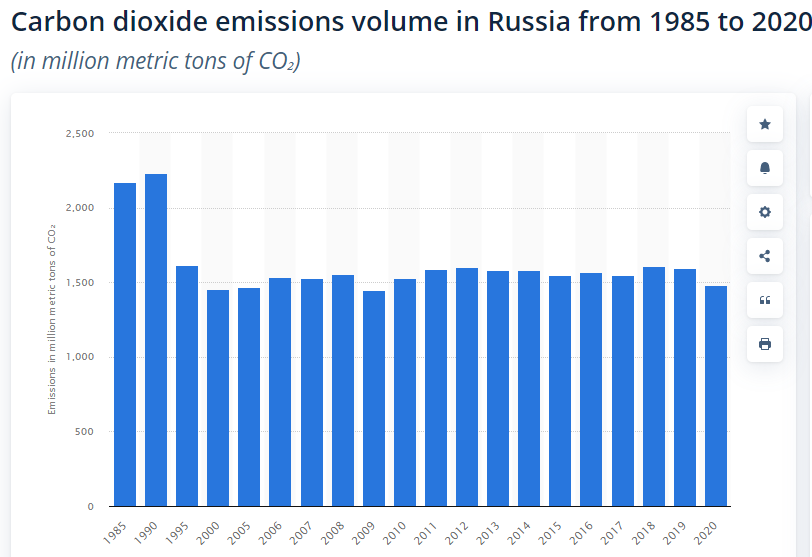
Source: https://www.statista.com/
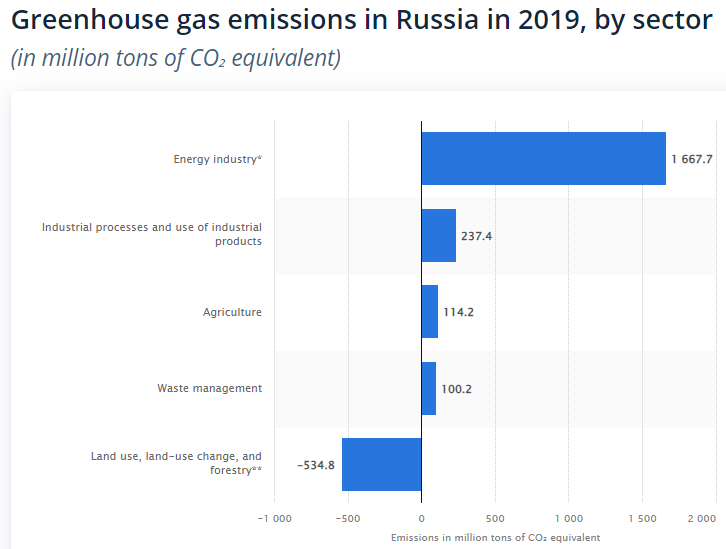
Source: https://www.statista.com/
Gustafson’s book has been endorsed by the New York Review of Books as the justification for the US-led embargo on Russian exports of oil and gas. “If one views the Russo-Ukrainian war as a matter of energy politics,” the review admits, “there are clear material as well as historical, political, and cultural reasons for Ukraine’s victimization… Gustafson [gives] a dry but persuasive marshaling of facts that in the redistribution of wealth and power that will result from climate change, Russia is doomed. After reading Klimat, Russia’s attack on Ukraine begins to look like the convulsion of a dying state… The scientists, activists, and businesspeople who might help Russia cope with climate change are also among those likely to emigrate. Klimat’s time horizon of 2050 is short, but Putin’s is even shorter: he is now almost seventy years old. After him will come the deluge, the wildfires, the droughts, the collapse.”
Gustafson’s weapon is even more powerful than Greta Thunberg (lead image) the New York Review declares. “Russia’s days of hydrocarbon-funded might are numbered. Unfortunately, the end of this era will not come soon enough for Ukrainians, or for the planet ”
This makes powerful reading. Where does the evidence come from?
According to the record Gustafson makes himself in 85 pages of his notes, references, and index – that’s 27% of his 312-page book – he has met and interviewed no senior executive from the Russian oil, gas and coal companies; none of them, and no official from the supervising government ministries, have talked to him.
Rosneft, LUKoil, Gazprom, Novatek, and the other publicly listed Russian energy companies have all identified more than a dozen analysts working for the leading investment banks in the world who have specialized in their coverage of the companies’ business; many of these banks are US corporations with offices a stone’s throw away from Gustafson. They communicate regularly with the Russian companies. Not one of them has been contacted by Gustafson; not one of their reports has been cited by him.
Like the banks, the US-based ratings companies – Moody, Standard & Poor, and Fitch – have regularly analysed and reported on the Russian energy sector and each one of the companies Gustafson claims to know, whose future he claims to be able to forecast. But Gustafson hasn’t read a single one of their reports; he doesn’t mention them. The Russian company prospectuses, the banks identified as financing them, and the international law firms which have represented them also appear to have been left in the dark by the professor — and they him.
It is the same black hole in Gustafson’s treatment of the Russian metals companies which consume the most energy in the domestic economy; emit the largest volumes of CO2 (plus other pollutants); and dominate the world markets for their exports. He explicitly mentions Norilsk Nickel and Rusal (Russian Aluminium); but again, he has talked to none of their executives or spokesmen, nor the international bank analysts who know their business plans and who make their living predicting their future financial results. Here are the big ten analysts of Nornickel; Rusal lists nineteen of them. Half of the Nornickel analysts also cover Rusal. Their telephone numbers and email addresses are publicly displayed. Gustafson didn’t make a call.
How does such ignorance — methodically footnoted and bibliographed — justify either the analyses of fact or the predictions of the future which Gustafson serves up?
One answer can be found in the telltale index. Counting pages per name, Putin comes first; next comes Anatoly Chubais, the Russian government official closest to the US Government; Gustafson introduces him in phrases from twenty-five years ago – “the best known of the Russian liberal reformers” and “the father of Russian privatization”.
Gustafson says he depends on Chubais for his understanding of Russian policy views on nuclear energy, renewable energy sources like solar and wind, and investment strategy for high technology modernization. More, he writes, “over the past forty years Chubais has been the most significant figure in the history of Russia’s post-Soviet transformation into a market economy…as the head of the Russian electricity monopoly, United Power Systems (UES), where he fought and largely won – a bitter decade-long battle for the radical restructuring of the power sector… he founded Rusnano, a visionary new state-sponsored start-up charged with developing next-generation nanotechnologies…Now in his mid-sixties, his innovative verve is undiminished, and he has lately reinvented himself yet again, as the would-be father of Russian sun and wind…Chubais has led the way for his view of Russia’s future.”
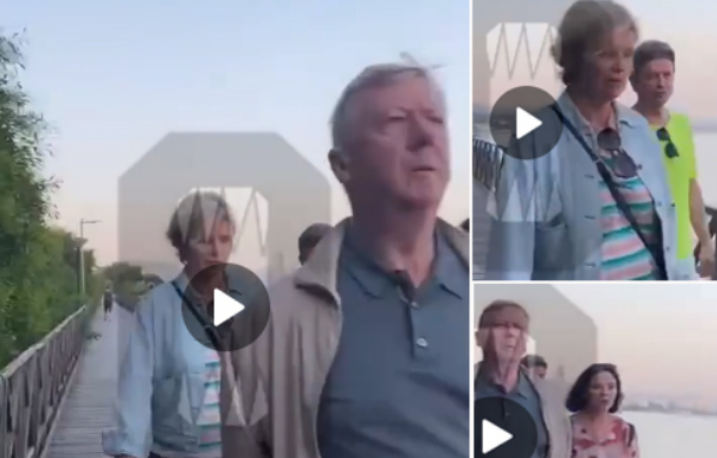
In mid-March Chubais hurriedly left Russia, flying first to Turkey, then to a villa on the Ligurian coast of Italy, then to Tel Aviv. This month he has been photographed with his wife and bodyguards in Limassol, Cyprus. The Rusnano grand larceny scheme for which Chubais is now under prosecutors’ investigation in Moscow involves over-valuation of the holding’s portfolio, boosted by bank loans beyond repayment capacity, and skimmed into salary, bonuses, personal real estate, and offshore bank accounts. The only Russian investigator not to have opened the Chubais corruption file is Alexei Navalny’s Anti-Corruption Foundation (FBK).
This is so far removed from the evidence of the Russian abuse of power and fraud investigations; the London, New York, California court records; the US, Swiss and Cyprus money laundering and asset tracks; and now the prosecution of the grand larcenies of Rusnano, Gustafson’s assessment of Chubais has to be judged the subliminal message of the book – his endorsement for what Chubais has represented in Washington from the beginning, the US candidate for Kremlin regime change, camouflaged this time round by global warming science, solar panel arrays, and wind turbines. For the evidence on Chubais, start by clicking here.
Chubais’s well-known protégé and successor, Alexei Kudrin, is identified by Gustafson as the sole Russian official whom Gustafson credits for standing up against the oil and metals oligarchs. In the evidence file this is demonstrably false. Gustafson notwithstanding: “Kudrin restored Russia’s finances, which had disintegrated under Gorbachev and Yeltsin. He paid off Russia’s external debts, balanced the budget, reformed the tax system, and created a rainy-day fund to store Russia’s revenues. His resolutely conservative policy has been faithfully continued his successor as minister, Anton Siluanov, and under Putin’s new prime minister, Mikhail Mishustin…With one ear, Putin listens to the oil industry; with the other he listens to the Ministry of Finance.”
“Where do Putin’s ideas on climate change come from?” Gustafson asks at the start of his book. This is how he answers – and so confident is Gustafson, he and his Harvard publisher haven’t thought it appropriate to double-check with any of the obvious experts. Instead, Gustafson acknowledges his sources among Russia warfighters like Harley Balzer, Peter Reddaway, and Angela Stent. “The first full-length exploration of Russia both as a prime source and a victim of climate change. Anyone interested in…Russia’s future should read this data-rich and gracefully written book”, says Timothy Colton on the dust jacket blurb. Identified inside the book as Gustafson’s personal friend, Colton is a Harvard professor who has doubled as a US Navy spy.
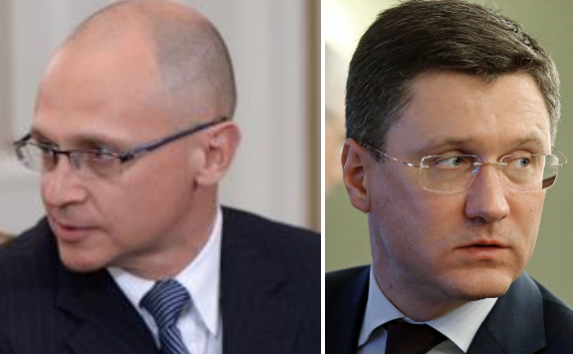
After Chubais and Kudrin, the two Russian government officials whom Gustafson also endorses are Sergei Kirienko (left) whose appointment to run Rosatom Gustafson calls “an inspired move”; and Alexander Novak (right), whom Gustafson reports as “a reform-oriented financial expert…an able and experienced hand in a top spot”. Kirienko is now deputy chief of the Kremlin staff and the only senior member of that staff whom the US has not sanctioned. Novak is now the deputy prime minister for the energy sector and one of the few senior officials in the sector not sanctioned.
In place of the history of escalating US sanctions since 2014, Gustafson leaves a gaping hole. These are “climate-related”, he acknowledges. That they have materialized at all is by Russia’s fault, not by US and NATO plan. They were “imposed”, in Gustafson’s interpretation, “by the United States and the European Union in the wake of the 2014 seizure of Crimea and Russia’s role in eastern Ukraine”.
Sanctions are also inexorable – indeed, they must remain in place if the Russian oil and gas industries are to be deprived of the investment and technology required – Gustafson thinks – for the “slow transition scenario” for improving Siberian oilfield yields and opening the Arctic seabed oilfields. “The fast-transition scenario would clearly be highly unfavourable”, Gustafson concedes to be the strategic rationale for sanctions, but he avoids admitting it is part of his inexorable Klimat plan.
Inexorable in this new book means that Russia will be defeated and destroyed if the US plan succeeds. In the bowdlerized version of the plan, headlined this week in the Murdoch press, Mother Nature, the Green Party in Berlin, and Greta Thunberg are joining hands with NATO and on the battlefields of the Ukraine they will achieve “the inevitable result”.
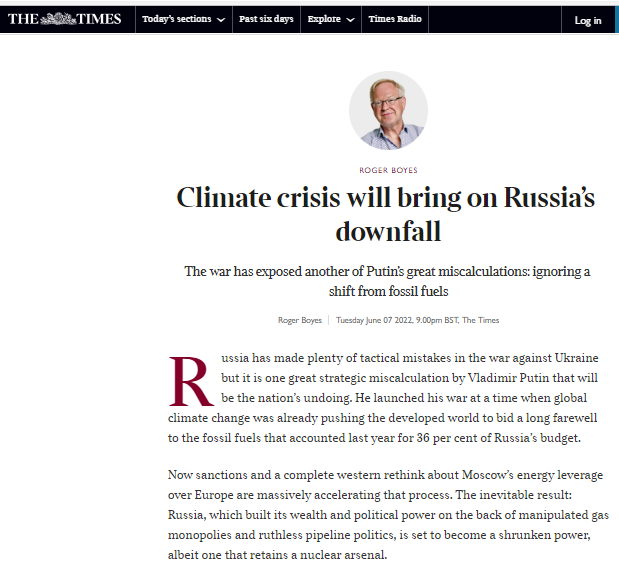
Source: https://www.thetimes.co.uk/
If this is what Gustafson and the Harvard printers call inexorable, and the Times of London inevitable, is it any wonder that genuine climate science should be discredited in Russia first of all; China next; and then in the rest of the world?
NOTE: Gustafson makes a side living as a director of a commercial consulting business called Cambridge Energy Research Associates (CERA), which is owned by IHS Markit, a New York-listed conglomerate currently worth $4 billion. IHS has merged with S&P Global, owner of the Standard & Poor’s rating agency. CERA sells Gustafson’s material to a confidential list of clients including commercial energy companies, US government agencies, and NATO governments. It claims to have a Moscow office.


Why has Greta not yet gone to Kyiv to get her AK-47, and her 7 days of training, and a ride to the Line of Contact in Donbas?
I thought she had principles.
That is cheap. Come on you can do better.
Gustafson is purveying deeply stupid stuff. Aside from the points against him Helmer makes, he apparently has no idea of the CC reality if he thinks ‘decarbonization’ will have a decade or two — or indeed any relatively long-term time frame before the global excrement hits the fan — to render Russia a geopolitical has-been.
To the contrary. CC, when it really hits, will either make Russia — because the bulk of it is Siberia — and China — because it controls Tibet and the Himalayas, and the rivers that flow from there upon which a third of humankind depends — into the dominant geopolitical players or else killing zones for their inhabitants.
I’ll confine my comments to Siberia, a territory so vast it constitutes 10 percent of the world’s landmass. While the land there supports plants and trees, underground of course it’s permafrost: cryotic soil, ice-rich, extending 80 meters deep. That permafrost’s topmost layer has always thawed seasonally. But as global warming has advanced, each year Siberia’s summer thaw has been longer, hotter, and deeper. The heat wave in 2020 started fires smouldering underground in the frozen peatland—ancient, partially-decomposed plants—of which the permafrost is mostly composed.
What’s that mean going forward?
Firstly, the uppermost permafrost’s deepening thaw in summer makes the organic matter in it decompose, so bacteria will eat it, releasing gigatonnes more carbon dioxide and methane into the air than in previous years.
Then, the lower-level peatland in the permafrost will grow warmer, drier, and more combustible. That spreads those already-ongoing subterranean fires, which feed on the methane released as the peatlands’ organic matter decomposes as it’s warmed. Even more gigatonnes of methane pour from the permafrost into the atmosphere.
And after that the ice in the deep permafrost melts. The surface above then slumps and subsides. Suddenly, thousands of lakes—some kilometers wide—appear across Siberia, speeding the permafrost’s thawing along their shores, expanding in size and depth.
This has already begun —
https://www.discovermagazine.com/environment/massive-craters-in-siberia-are-exploding-into-existence-whats-causing-them
Scientists reckon some seventeen trillion tonnes of carbon dioxide—at least double the amount in the Earth’s entire atmosphere—is locked in the tundra. A similar quantity of methane is stored there and at the Arctic Ocean’s bottom, and methane is twenty-eight times more potent at trapping heat than carbon dioxide. If all that’s released, you’ll get temperatures that aren’t in the historical record.
They aren’t in the historical record because, for one thing, the human race wouldn’t have survived them. Nor would most life on Earth. As is demonstrated by the fact that it didn’t: there’ve been five great extinction events in Earth’s prehistory, each coinciding with massive methane releases into the atmosphere. The Permian Mass Extinction and the Paleocene-Eocene Thermal Maximum, in particular, almost ended all life on the planet.
My apologies for rehearsing all this for those who already know it. I bring it up to demonstrate that Siberia is Ground Zero for CC (with the Arctic, where Russia is dominant, close behind) and so Russia will choose either to die or to begin some comprehensive geoengineering program.
I don’t think Russia will choose to die, but if it does most of the rest of the world will follow, including the US. Either way, Gustafson’s utterly ignorant scenarios about ‘decarbonization’ enabling geopolitical games whereby the American empire continues to hold sway are comedy gold, if you have a suitably dark sense of humor.
Chindia ( China plus India) will join Russia in the comprehensive geoengineering program. It will probably begin with placing a sulfuric acid micro-droplet shroud in the upper troposphere all around the earth, to reflect some sunlight back into space before it can reach the surfacesphere and warm it.
” As we starve and freeze and die beneath a silver yellow sky.”
“Al Gore has no clothes”
Climate change during the last 65 million years
https://en.wikipedia.org/wiki/Geologic_temperature_record#/media/File:65_Myr_Climate_Change.png
The neo-inconvenient truth……
We are still in An Ice Age. That is exactly why most humans crowd close to the equator. Where I live, 45 degrees South, we occationally have ice bergs floating off the coast. Not many people choose to live here. It is too cold……..
“An ice age is a long period of reduction in the temperature of Earth’s surface and atmosphere, resulting in the presence or expansion of continental and polar ice sheets and alpine glaciers. Earth’s climate alternates between ice ages and greenhouse periods, during which there are no glaciers on the planet. Earth is currently in the Quaternary glaciation. …..”
https://en.wikipedia.org/wiki/Ice_age
https://en.wikipedia.org/wiki/Quaternary_glaciation
When the ice caps on the North and South Poles disappear, we will enter a Greenhouse Period.
Nice try. When the skycarbon load is higher than it has been throughout the entirety of the Pleistocene, and is trapping enough heat that the legacy IceCaps which formed several million years ago are melting back preparatory to melting away altogether, we are already in a greenhouse.
When the last major ice is gone, the heat-sink it provided will be gone and the even-faster-upbuilding heat will then build up even more fasterer more than that. And life will become difficult and unpleasant.
Drumlin, you are redefining an accepted scientific term, “Ice Age”.
“When crocodiles roamed the Arctic”
https://www.newscientist.com/article/mg19826611-200-when-crocodiles-roamed-the-arctic/
This article was published two years after Al Gore’s “Inconvenient Truth”. I doubt if New Scientist would be allowed to published it today.
“……During this time, when dinosaurs roamed the almost subtropical forests of an ice-free Antarctic, conditions on the other side of the planet were even more remarkable: the Arctic Ocean was a gigantic freshwater lake infested with crocodile-like reptiles.
As the modern world warms, there has been a surge of interest in this “hothouse” period. What sustained such …”
It isn’t much of an Ice Age if man made global warming melts off all of the ice. Perhaps we could call what’s being engineered into existence the Iceless Ice Age.
When the wet-bulb heatwave massacres start, will you finally kindly shut up?
How much land “could” Russia lose under a total hothouse scenario? To guess that, one would have to be able to know roughly how much melting all the on-land ice features would raise sea level by. One would also have to know how deep the Siberian Permafrost is and what percent of it is water. And if the total hothouse effect thaw-melted all the Permafrost all the way down to whatever parent bedrock it is resting on, one could guess how much elevation it would lose based on the percent of it is water and what percent of the non-water is gasifiable carbon. And knowing that would allow us to guess how far down the ex-Permafrost would retreat by in a straight-down direction.
Adding the amount of downshrinkage by the ex-permafrost to the amount the sea level would rise would give the total of how much “overhead difference” there would be between the ex-permafrost and the new sea surface.
My AWAG ( Amateur Wild Ass Guess) is that Russia would lose 2 or 3 million square miles of land area under that final ultimate scenario. How green and pleasant the still-overwater remainder of Russia would be is unguessable by me.
Great summary, Michaelmas.
Thank you! A most excellent attempt at forcing reality into the discussion!
Our elites are amazing. Too fat, dumb, and happy to let an extinction level event intrude into their bubble? Make sure the 80 year olds stay in charge because they will not live in this hellscape they are creating? Who knows? But the Western elites, the WEF, the billionaires, they have failed humanity.
Its good to know that the US, facing a security competition in Asia with an more populous rival with a faster growing economy and a bigger GDP by some measures, has elected to go all in on a proxy war with a declining power which due to demographics and changes in the global energy mix will be a non-player in 30 years anyway.
“…will be a non-player in 30 years anyway.”
A sweeping prognostication if ever there was one. This presupposes a lot of things, not least that Russia is a one trick pony and will remain one, with no foresight to diversify its economy, build deeper economic ties with “friendly nations” and tap into its demonstrable technological prowess (currently deployed in defense) to become a high tech (global) player. Where hollowed out service economies in the West sit on the risk curve vis a vis their continued existence as power players vs where Russia sits is a speculator’s errand (especially given how the world order is reshaping itself) , and unless you know something I don’t, i’m inclined to remain non-commital with respect to where the chips will fall in say a decade, much less 30 years.
KD’s comment, to my eyes at least, appeared to be sarcastic…
I knew the siloviki would come after me for this remark. Even Russian leadership will acknowledge demographic and economic challenges facing Russia’s future. Putting that aside, you have a West that is simultaneously:
1.) Dumping resources into a proxy war in Ukraine to weaken Russia;
2.) Simultaneously claiming Russia will be cooked in 30 years anyway.
Not to mention the risks of nuclear catastrophe and the rest of it from Western “help”. When you come up with a plan to slaughter hundreds of thousands, perhaps millions of people, in a proxy war and even risk nuclear war (which based on the balance of forces is likely to end in a Russian victory or human extinction), is logical coherence in the first instance too much to ask?
A lot of people in the West seem to think it is a petro-state, apparently not noticing it has a very diverse mixed economy.
Last year Russia was the world’s largest exporter of wheat. It builds airplanes, military and civil, builds the world’s largest nuclear icebreakers, quite a lot of agricultural machinery, automobiles and so on.
Even Putin, a couple of years ago said the economy was to oil dependent on oil exports but it has a rather variegated mixed economy.
Divide and conquer. We learned that from the British.
It is divide and rule (divide et impera), and we learned it from the Romans…
‘Thane Gustafson, a Georgetown University professor publishing at the Harvard University Press’ or another way to look at him is a Courtier in a late-stage empire. Telling his superiors what they want to hear, not going against the consensus, never giving a divergent opinion and just going with the flow which gives him a comfortable living – until it doesn’t.
It’s an application for trading up to a new condo one level higher in the Beehive.
It’s an application for trading up to a new condo one level higher in the Beehive.
Essentially.
Celebrated by Rand, which is CIA-adjacent.
Ding! Ding! Ding!
Our world in data puts per capita CO2 emissions in the US at 14,24 tons and in Russia at 10,81. If we look at past carbon prints then US’s would be several times higher than Russian but now Gustafson wants to explain us the US is the saviour of the world by fixing Russia in Ukraine ‘against climate change’?
That is gross, IMO.
A lot of words, but no overlap whatsoever with, for instance, this 2013 observation: “By 2017 U.S. gas imports from eastern Canada will have completely flipped to exports” in the Growing Northeast Production Prompting Historic Market Shift, Redirecting Gas Flow Patterns.</em That an ancient report was published in the American Oil & Gas Reporter. It's way past 2017, but the article seems still relevant. It took White House intervention to precipitate this "historic market shift."
As far as I know, the pipeline expansion for fracked gas transportation from the Marcellus Shale in Pennsylvania to the Goldboro, Canada is still under way. Go ask people in Weymouth, MA, about the new compressor station that was built there recently in an act of unadulterated environmental racism endorsed by the Federal Energy Regulatory Commission (FERC).
There is nothing in this post about U.S. fracked LNG exports. Why should we take any of this blather seriously?
Well our love for the climate certainly explains why the new hydrocarbon market is dependent on loading oil on a ship, driving it somewhere else to be mixed with some other oil at sea (shat could possibly go wrong?), and then burning more fuel to get it to where it will be refined. The refinery being historically fed by pipeline. Or instead of pipeline gas we’ll liquify it far away, ship it where needed and then turn it back into gas to inject into the pipeline network.
My only other question is where do all the exotic metals and materials needed to decarbonize come from? The ones that are going to form the basis of the US leaving Russia in the dust? And who manufactures the components of these renewable energy systems?
The stoopid, it burns.
My first thought is that this is pure politics. Writing a book to guide the manufacture of consent, etc. I notice the omission of accountability standards for everyone except Russia. Venezuela, Mexico, the KSA? My second thought is this is also an indirect way of targeting China. So of course somebody from Harvard is writing it all up to serve as a part of a propaganda-bedrock. But the USA is the biggest pig at the CO2 trough. We have become hyper-dependent on oil/gas. Switching to EVs won’t make a significant change. It will help, but the whole world would need EVs and that will take massive amounts of oil for manufacturing, etc. In all of the fog about CO2, the best piece of information I have heard – and I have no idea how reliable it is – is that the Biden administration is spending lotsa money to find ways to actually scrub CO2 from the air. However, I’m pretty sure that the CO2 in the upper atmosphere is out of reach already. Maybe we can send a fleet of SpaceX missiles up there to precipitate it out – but watch out below. Actually we should probably put diapers on all those rockets.
I haven’t read the Gustafson book. In general, if anybody talks about energy use and climate change and doesn’t talk about the cost of the US military garrisons around the world, what are they really talking about?
And I doubt the book talked at all about the MIC energy costs. Another big hint that it was propaganda.
I see books like this as another example of how people in positions of power try to use current issues that are important to liberals, such as climate change, to get liberal voters onboard with all of the militarism. If you can frame it in the context of Russia = Bad because “Climate Change”, then you might get some liberals to agree with the whole Russia bashing frenzy and the sending of billions of dollars of weapons to a country that is already mostly defeated. It would be nice if liberal voters understood how they are being cynically played.
I think that’s about the long and short of it. And it serves to calcify received wisdom “Russia’s doomed thanks to climate change” will echo around dinner tables from Georgetown to Brooklyn among those who think themselves pretty clued up for a while now. Note such opiners don’t actually have to read the book, but the NYT/WaPo etc. review of the book.
One can play a similar game in certain situations by adopting and repurposing ‘woke’ vernacular and using it, as a sort of cheap rhetorical trick. Can be quite fun.
I don’t see the point of analyzing Gustafson’s garbage. To even discuss it is to engage stupidity, so I won’t.
There’s a different way to come to the same conclusion:
1. We have to stop fossil fuels or lose our civilization to climate change (and sooner than later)
— It amazes me that this is not the first point in anything that debates FF or Climate
— Amazes me further that this easily grasped bit of science is politicized (politicize policies to do something about it, but not the basic scientific fact set)
2. Russia is a high cost (either in dollars or in cost of energy to produce energy) oil producer so it will exit before the Saudis who will be last
3. Ergo, Russia which is very reliant on oil sales will skinny down to something much smaller.
— One can call that collapse, but since everyone will be in economic contraction…
See? Wasn’t hard. No Putin, Neoliberals, Oligarchs, shadow state, military-industrial complex, or war. Just first principles.
(Admired Michelmas’ comment about Siberian permafrost potential carbon release. Spot on. Our civilization is over if the carbon comes out of Siberia.)
Since a lot of sincere well-intended people will not know it is stupidity because a Haaaah-vuhd Professor wrote it, perhaps one should dismantle the stupidity into all its separate little stupid nuts and stupid bolts and stupid straps and stupid plates so that the sincere well-intended people can see the stupid all laid out.
Its not pleasant to clean up after someone with projectile diarrhea when they miss the toilet, but somebody has to do it.
Regarding the poor scholarship of Gustafson: I was an analyst for 20 years of the Canadian oil and gas industry (a couple of other industries too) for a major union in Canada. I read what industry, bank and government analysts said. From time to time we would speak to each other. That Gustafson would not do this is shocking to me. It is a sign of total incompetence. It seems the US is infested with senior officials and analysts whose incompetence is beyond belief. It is another indicator of the accelerating decline of the US.
The upholders of non-decline are retreating into various little spheres and fortresses of solitude, hoping to broadcast to eachother and to anyone else who deserves to hear, while keeping their existence secret from the Militant Backwardite Stupidite authorities.
And in the widest scope, if Russia is doomed by Climate Change, so is everyone else.
” We’ll all doom together when we doom”.